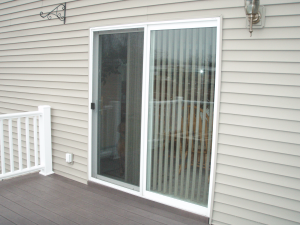Jammed and leaking sliding doors are common during rainy seasons. Rain water not only damages the side walls of the door, but can also take its toll on the structure underneath, calling for sliding door repair services. When your sliding door starts showing signs of a malfunction, it is probably time to call a professional for a thorough checkup and repair. A damaged door channel, gaps in the frame, and unsealed joints are some of the common problems that can lead to water seeping through the sliding door, which may worsen the problem. To help keep such issues at bay, this blog post provides some simple steps you may follow before bringing in a sliding door repair professional. Read on.
1. Unclog the Weep Holes
Weep holes, also referred to as drainage holes, are small slots built into either ends of the door track, which drain out water. Overtime, these holes get clogged by dirt brought in by rain water. You can use a stiff wire or crevice tool to clear the holes. If the seepage problem persists, you may have to drill additional slots on the outside of the panel for proper drainage. If the holes are on the inside of the track, it could lead to water seepage inside the house.
2. Seal any Gaps Between Door and Frame
Another common cause of water leaks through sliding doors is worn-out seals. Daily wear and tear can cause old caulk to deteriorate. If such is the case, carefully remove old caulk and apply new caulk to seal the gaps between the door and frame. In addition, you can use a polymer sealant to seal the edges of the door and screw holes on the frame to prevent water seepage.
3. Fix Frame Installation Issues
The frame plays a key role in keeping the sliding door intact and preventing water seepage during rainy season. If the frame is not properly installed or aligned with the door, it allows water to seep through. One of the best ways to prevent the problem of poor framing is hiring an experienced sliding glass door repair expert, as addressing most installation issues require professional expertise and equipment.
4. Replace Chewed Sliding Door Roller
Rain water brings sand grains that may jam the tracks of a sliding door. Continuous use of the sliding door while the sand grains are still present in the tracks corrodes the metal or chews away the rollers, leading to gaps between the frame and door. The gaps give way to water, thereby causing leaks. In such cases, clean the track and if that doesn’t work, get your sliding door checked by a professional.
5. Replace Cracked Panes
A cracked glass can also lead to water leakage. If your door has developed a crack and is under warranty, contact the manufacturer immediately. In some cases, addressing the issue may require minor sliding door repairs such as a pane replacement, whereas in some cases, the issue may need a replacement. If the warranty has expired, AJ Doors can can help determine whether the door needs repairs or a replacement and provide expert sliding glass door repair services.
Wrapping Up
Though you may find numerous DIY guides online on how to fix leaking glass sliding doors, doing it yourself can be a complex process, and may even worsen the problem. If you are facing any trouble with your sliding doors, speak with the experts at AJ Doors. Based out of Brisbane AJ Doors is a team of extensively trained, certified and experienced sliding door repair experts, equipped with cutting-edge equipment to install and repair all types of sliding doors in both commercial and residential properties. To learn more about our sliding glass door and window repair services, call us at (07) 3180 2344 (office), (Brisbane’s southside), or (Brisbane’s northside). Alternatively, fill out our contact form and we’ll get back to you, shortly.













